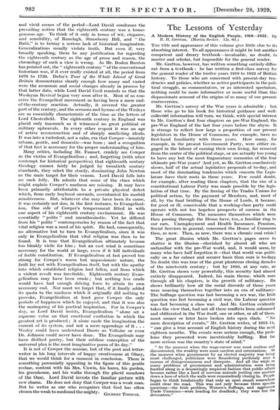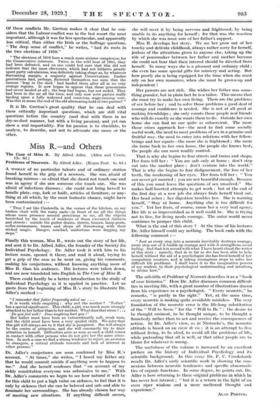The Lessons of Yesterday
A Modern History' Of the English People, -1910-1922.. By R. H. Gretton. (Martin Seeker. 12s. 6d.) THE title and appearance of this volume give little clue to its absorbing interest. To all appearances it might be but another
competent and dreary textbook—invaluable, no doubt, to master and scholar, but impossible for the general reader.
Mr. Gretton, however, has written something entirely differ- ent from a textbook ; he has written a first-class survey for the general reader of the twelve years 1910 to 1922 of British history. To those who are concerned with present-day ten- dencies and policies, whether as active participants in the poli- tical struggle, as commentators, or as interested spectators, nothing could be more informative or more useful than this dispassionate account of the origins of so many of our present controversies.
Mr. Gretton's survey of the War years is admirable ; but those who go to his book for historical guidance and well- collectfd information will turn, we think, with special interest to Mr. Gretton's first four chapters on pre-War England, the pre-War England of the last four years before the abyss. It is strange to reflect how large a proportion of our present legislators in the House of Commons, for example, have no first-hand familiarity with those years. How many, for
example, in the present Government Party, were either en- gaged in the labour of earning their own living, far removed from the centre of the political stage, or are actually too young to have any but the most fragmentary memories of the four ultimate pre-War years? And yet, as Mr. Gretton conclusively shows, half of the actual legislative proposals of to-day, and most of the dominating tendencies which concern the Legis- lature have their roots in those years. Few could doubt, for example, after reading these chapters, that the rise of a constitutional Labour Party was made possible by the legis- lation of that time. By the freeing of the Trades Unions for political action, by the payment of Members, and, most of all, by the final bridling of the House of Lords, it became,
for good or ill, conceivable that a working-class party could operate with not too hopeless prospects of success in the House of Commons. The measures themselves which were then passing through the House have, too, a familiar ring to our ears. Unemployment and Health Insurance, Pensions, Social Services in general, concerned the House of Commons then, as now. Then, as now, there was a chronic coal crisis I
The great illusion which Mr. Gretton's pages serve to shatter is the illusion—cherished by almost all who are
unfamiliar with the pre-War world, and, it. would seem, by many who have half forgotten it—that that world was politi-
cally on a far calmer and securer basis than ours .is to-day/ No doubt this was true of the great plenteous closing decades of the nineteenth century ; but by 1910, at any rate, as Mr. Gretton shows very powerfully, this security had almost entirely disappeared. Indeed, his main theme, which runs through all his chapters, is the growth of militancy. He shows brilliantly how all the social discords of those years were weaving themselves together into an era of militancy. The Suffrage question was fast becoming a sex war, the Irish question was fast becoming a civil war, the Labour question was fast becoming a class war. And Mr. Gretton evidently takes the view that, had not all these conflicts been subsumed and obliterated in the War itself, one or other, or all of them, must sooner or later have broken into open clash. " No mere description of events," Mr. Gretton writes, of 1913-14, " can give a true account of English history during the next eighteen months. The events were serious enough, the prob- lems they presented were inextricably baffling. But far more serious was the country's state of mind."
" At the moment when the wage-earner was most restless and discontented, the wealthy were most careless and ostentatious. A6 the moment when government by an elected majority was being most challenged, politicians were floundering perilously near a morass of disingenuousness and disrepute. And all the while so many problems of government and administration were being hustled along in a despairingly empirical fashion that public affairs became rather like a herd of nervous animals jostling one another down a lane of which the walls were remorselessly closing in. People began to think fatalistically that only an open smash somewhere could clear the road. This was not only because three specific) questions—the Irish problem, Women's Suffrage, and aggressive Trade Unionism—were heading for deadlock ; they were but the detonators."
Of these conflicts Mr. Gretton makes it clear that he con- siders that the Labour conflict was in the last resort the most important, although it was far less spectacular, and apparently less critical, than either the Irish or the Suffrage questions. " The deep sense of conflict," he writes, " had its roots in the two elections of 1910."
" The elections of 1910 bore a much more sinister complexion for the Conservative interests. Twice, in the wild heat of 1905, they had been defeated, and no one could feel sure that this did not indicate that the mass eleetorate, which had not hitheito greatly upset party calculations, was definitely taking shape as, by whatever fluctuating margin, a majority against Conservatism. Earlier , generations had, perhaps, flattered themselves too soon that the famous ' leap in the dark ' had landed them after all in no very strange regions. It now began to appear that those generations had never landed at all ; the leap had begun, but not ended. They had been in the air all the time, and only now were parties really landing upon a fully wakened and conscious wage-earning vote. Was this to mean the end of the old alternating hold of two parties? "
It is Mr. Gretton's great quality that he can deal with these critically important questions, which are still vital questions before the country (and deal with them in no dry-as-dust manner, but with a living passion), and yet can show a real impartiality. For his passion is to elucidate, to analyse, to describe, and not to advocate one cause or the other.

































 Previous page
Previous page